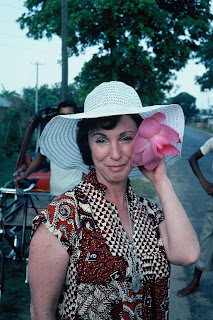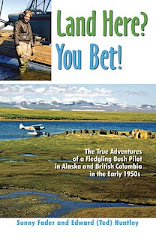OFF TO BANGLADESH
Packing for my trip proved a challenge. The nanotechnology available today did not exist in 1975. I had to figure a way to get my cumbersome tape recorder, portable computer, printer, and the bulky converter transformer I needed so I could plug them all in, plus my research, a ream of paper and my clothes and personal necessities…all into a medium-sized suitcase and duffel bag. This was essential because I would be carrying all this myself, even after the crew joined me. It’s a cardinal rule on documentary shoots: everyone carries their own “stuff.”
A word about my wardrobe for the trip. While Bangladesh is home to some Hindus, it is primarily a Muslim country. Fortunately for me, the Muslim culture in Bangladesh is more lenient regarding its rules about clothing than it is in many other parts of the world. I wasn't required to wear an abaya (a long robe that covers the body from neck to toe) or hijab (a veil or head scarf), but I did have to pack some long dresses to meet the standards of modesty required in some of the areas in which we would be working.
 |
| Sunny in Bangladesh, wearing one of the more discrete long dresses she packed in deference to the modesty rules followed by Bengali Muslims. |
That was fine with me. I had never been to London. Sandy had called ahead, so putting the production package together and paying for it wouldn’t take but a few hours, giving me time to do a little sightseeing. I hadn’t, however, taken into consideration what spring is like in London.
April in Bangladesh is hot and muggy. I had packed accordingly. April in London, on the other hand, is, well, cold—very cold—and damp. I had nothing suitable in my suitcase to keep this “Florida girl” warm enough for sightseeing. I nearly froze tracking down the equipment we needed. All I could think about was getting back to the nice, warm hotel and a bracing cup of hot tea. Seeing the sights of London would have to wait for another time.
A quick aside on the missing equipment: Sandy and the crew finally located our Miami shipment at the New Deli airport on the way home from the shoot—quite by accident. They spotted the shipment, worth several thousand dollars, dumped in the corner of a hanger, unsecured and gathering dust. Some airport bureaucrat (probably for a few under-the-table-dollars) had bumped our shipment for some agricultural equipment. When Sandy tried to get the equipment shipped back to Miami the New Deli official balked.
“Sir,” the bureaucrat insisted, “It is addressed to Dhaka, and that is where we must send it.”
After a long argument, “oiled” by a few well- placed dollars, Sandy finally prevailed. However, I am certain—between what he paid for the second production package and what it cost him to change the airport official’s mind—Sandy’s budget for the project took a substantial hit.
But back to my trip to Bangladesh. After 35 years, the memories of my journey that remain most vivid are the ones connected with strong emotions. My plane trip there, for instance, is mostly a blur, except for one specific incident: a refueling stop we made in what was then the Shah’s Iran.
It was dark when we touched down and taxied to a stop on the dimly lit tarmac. Suddenly our plane was awash in light; illuminated from every angle by huge spotlights. As soon as the lights went on some forty or so soldiers in full combat gear, weapons drawn, burst on to the tarmac and surrounded the plane… some facing outward, some facing our aircraft. I don’t know whether they were there to prevent anyone from getting off, or someone from getting on. What I do know is that their presence was unsettling… frightening. We must have sat on that tarmac for some 30 minutes. The tension inside the plane was palpable, the mood—uneasy. I didn’t breathe easy again until we were safely back in the air.
It is hard to keep track of time when you fly at night, especially when the flight is long and passes through various time zones. My best guess is that we arrived in Dhaka close to midnight. The city's airport was very small. There were a couple other Caucasians on the plane, but the flight was made up mostly of Bengali and Indian passengers. We were all herded out of the cabin, down the metal staircase and across the poorly lit tarmac to an over sized corrugated shed that served as Dhaka's International Airport Terminal.
If any of the customs officials understood English they did a good job hiding the fact. There was something surreal about the whole experience: the muggy, suffocating heat inside the metal building; the single, naked light bulb dangling over the head inspector's desk; the disconcerting way the Bengali officials would stare at me, then whisper among themselves, though why they bothered to whisper I don't know. It had to be obvious to them that I didn't understand a word of their language. The inspectors read and reread my documents and rummaged through my equipment. I knew someone was waiting for me just beyond the door to take me to the Baptist Mission House, but that was little consolation as the inspection seemed to drag on and on for what felt like hours, although in reality it was probably no more than thirty to forty-five minutes.
At last they were finished with me. I put out my hand out for my passport, but the inspector shook his head and slipped it into his desk drawer. I panicked. I kept repeating the word "passport" and pointing to the desk drawer. The inspectors kept shaking their heads. Finally one of them thrust my duffel bag and suitcase into my arms and unceremoniously shoved me through the door and out into the night.
“It is okay,” the man from the Baptist Mission assured me as he loaded my luggage into his car. “That is how they do things here in Bangladesh. You will get your passport back when you leave the country.” It was too dark to see much as we drove through empty streets to the Mission House. By the time we got there, everyone was asleep. The gentleman who picked me up showed me to my room and I collapsed, exhausted, on my bed. Ablutions would have to wait until the morning.
NEXT TIME: IN BANGLADESH - A REMARKABLE TALE ABOUT A REMARKABLE MAN



Fascinating! I can't wait to read the next installment. You leave us on a real cliff hanger. You are one plucky person to travel to such a remote destination and to such an unfamiliar cultura all on your own!
ReplyDelete-Carolyn
Hey, girlfriend-
ReplyDeleteLove the hat. And the flower behind the ear is a nice touch - very "South Pacific"!
I, too, love that photo!
ReplyDeleteMy God! This is like Dickens! Can't wait for the next installment! Write faster! FASTER!
ReplyDelete